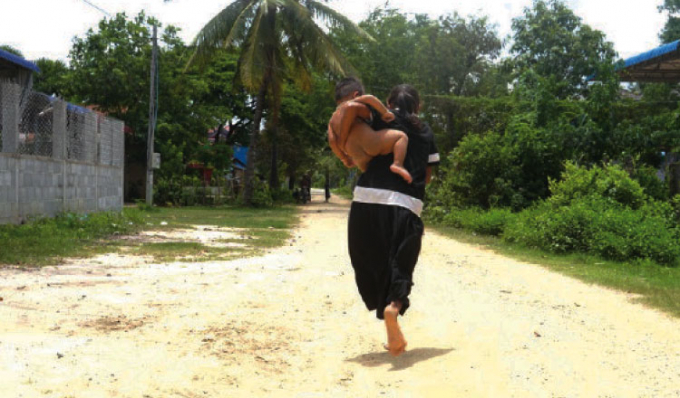June 16, 2025 | 19:59 GMT +7
June 16, 2025 | 19:59 GMT +7
Hotline: 0913.378.918
June 16, 2025 | 19:59 GMT +7
Hotline: 0913.378.918

A woman carries her naked child in an impoverished Cambodian village. Photo: KT
Countries have responded to the Covid-19 pandemic and the economic crisis by stepping up spending, but the trajectories of their debt burdens have diverged as only some nations have benefited from ultra-low interest rates, a study by credit insurance firm Euler Hermes has found.
A decade ago around 6 percent of government spending in both rich and poor nations was going towards interest on their public debt.
But for advanced economies it fell to around 4 percent in 2020, while for emerging markets it rose to 7.3 percent and for low-income developing countries it shot up to 13.7 percent.
Euler Hermes estimated low-income countries will need a minimum of $450 billion to step up their response to Covid-19 as well as maintain their finances to avoid long-term damage to their economies.
“In the absence of a comprehensive solution, heavy debt burdens may generate a permanent global divergence between rich and poor countries,” the report warned.
Euler Hermes said that while the international community was likely to help countries facing difficulties no overall debt resolution mechanism was likely to emerge.
But it said the proposal for an African “New Deal” that could see advanced countries step up aid to the continent would offer a viable solution.
The plan would seek to have a considerable amount of the $650 billion in International Monetary Funds funds that are to be released to member states be directed to Africa.
Euler Hermes also identified countries that are most vulnerable to sovereign debt stress.
South Africa, India, Brazil and Pakistan are among the top among emerging nations at most risk, although Euler Hermes believes they should be able to avoid defaulting because their debts are mostly held domestically and can be extended.
But Egypt is a worrying case because 39 percent of its debt is in foreign currencies and payments due in 2021 and 2022 amount to 15 percent of gross domestic product (GDP), said the company.
Iran, Kenya, Nigeria, the Democratic Republic of Congo, and much of Central Asia also made the list of vulnerable countries – as did Angola, which lost access to international debt markets in 2018, enjoys a temporary freeze in payments to G20 nations and is negotiating with China to lower its debt payments.
China is now the major official creditor to emerging and developing nations, with a third of them owing Beijing more than 5 percent of their GDP.
AFP

(VAN) The working delegation from the Ministry of Agriculture and Environment conducted an important trip to the Netherlands to strengthen strategic partnerships and sustainable development in the agricultural sector.

(VAN) The letter ‘A Plea from the Ocean’ not only evokes emotion but also awakens the human conscience to the responsibility of protecting life on Earth.

(VAN) The Department of Agriculture in South Africa has announced the country’s first mass vaccination of poultry to prevent local birds from contracting avian influenza.

(VAN) Establishment of the Mekong Delta Regional Agricultural Linkage Center, aiming for a closed value chain, deep processing, trading platforms, and international market connectivity.

(VAN) Gia Lai province has recently recorded 460 rare species of animals and plants, contributing to forest conservation and biodiversity planning in the region.

(VAN) Ms. Caroline Beresford, New Zealand Ambassador to Vietnam, expressed confidence that agricultural cooperation between Vietnam and New Zealand will develop sustainably, be climate-resilient, and promote gender equality.

(VAN) Vietnam reaffirms its commitment to international cooperation in fostering sustainable and responsible fisheries while ensuring resilient livelihoods for small-scale fishing communities.